On BajanThings Peter Burton explores the life of former Prime Minister of Barbados, Errol Barrow, with particular reference to his time in Britain as an RAF serviceman from 1940 to 1947. After leaving active service Errol Barrow achieved a BSc Economics at LSE before being repatriated to Barbados in 1950, where a career in politics beckoned.
Errol Walton Barrow (21 January 1920 – 1 June 1987) was a distinguished Barbadian statesman, visionary leader and a champion of Caribbean unity who led Barbados to independence on 30 November 1966 and then served as Barbados’ first and fourth Prime Minister. Prior to independence from 1961 to 1966 as leader of the Democratic Labour Party (DLP) Errol Barrow served as the third Premier of Barbados during the island’s transition from full internal self-government to being an independent nation.
Errol Barrow spent seven years in the Royal Air Force (RAF) from 1940 to 1947. Errol Barrow’s time in the RAF provided the foundation for his future political career and undoubtedly influenced his leadership style and helped him to guide Barbados through significant political and social change. Very little is written about Errol Barrow’s formative years spent as a RAF serviceman aged 20 to 27. He entered the RAF on 31 December 1940 as an Aircraftman Second Class (AC2). He left the RAF as a Flying Officer on 9 October 1947 having served the motherland for seven years. This was followed by three years secondary re-training, post active-service, where he read Economics and Industrial Law at the London School of Economics and Political Science (LSE) and Law at the Inns of Court, before being repatriated to Barbados in November 1950 after ten years away from home.
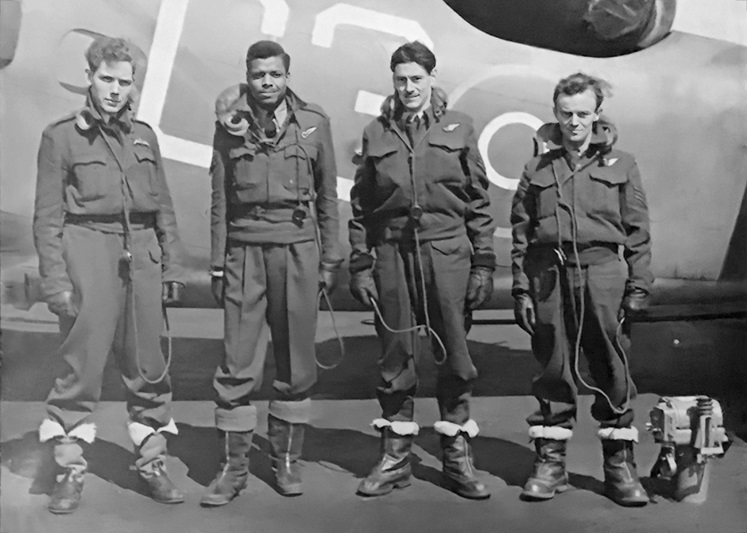
Errol Barrow attended LSE while it occupied two buildings on either side of Houghton St, not far from the Inns of Court where he also studied. While at LSE, Errol Barrow met Michael Manley of Jamaica, Forbes Burnham of British Guiana, Pierre Trudeau of Canada, and Lee Kwan Yew of Singapore, who were all to become his life long friends. He served as Chairman of the Council of Colonial Students and was influenced by Professor Harold Laski. At the time, LSE was under the Directorship of Alexander Carr-Saunders, who had overseen the School’s evacuation from central London to Cambridge for the duration of the Second World War. While LSE was in Cambridge, the Houghton Street buildings were requisitioned to house the Ministry of Economic Warfare, and later, various branches of the Air Ministry including the Department of Air Force Welfare. This provided another RAF link to LSE, as the department was concerned with all non-combatant aspects of service life such as the official RAF Entertainment Units, known as “Gang Shows”. Rehearsals and performances took place in the Old Theatre, usually used for university lectures.
On his return to Barbados Errol Barrow was drawn to politics and was elected to the Barbados Parliament in 1951 for St George as part of the Barbados Labour Party (BLP). Disillusioned with the state of Barbadian politics at the time, in 1955 Errol Barrow helped form the Democratic Labour Party (DLP) to press for social and political reform and independence from British rule. Barrow was defeated in the 1956 elections, but won a by-election for St John in 1958, which remained his political seat until his death.
On 4 December 1961 and 3 November 1966, the DLP won the general elections and Barrow as its leader became the third Premier of Barbados and first Prime Minister of the newly independent Barbados on 30 November 1966, serving two terms until September 1976. Errol Barrow returned to power with an overwhelming majority in May 1986 to serve as Barbados’ fourth Prime Minister. Errol Barrow died in office on 1 June 1987 aged just 67.
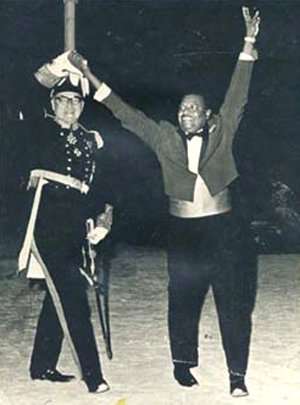
The RAF
During World War II Errol Barrow was a Navigator in a tight knit aircrew with RAF 88 Squadron, “B” Flight, 2nd Tactical Air Force (2TAF), seeing active service supporting the Allied ground forces, bombing German communication infrastructure positions and airfields where he accrued 48 bombing sorties giving him 103 hours and 25 mins of combat flying time. While flying with RAF 88 Squadron, “B” Flight, Errol Barrow would have seen and experienced first-hand the horrors of medium altitude bombing. Squadron Leader Alfred Barnes of RAF 88 Squadron remembered Errol Barrow as:
A bloody good Navigator – first class. Get you there, get you back. Never got in a flap. Lot’s of chaps did – at first anyway. You must understand it wasn’t always too cosy up there.…and Jerry throwing up all kinds of flak. Some chaps didn’t ever settle down to it. Never saw Barrow get in a flap. Good man to have along.
Source: “The Life and Times of Errol Barrow” by Peter Morgan published by Caribbean Communications Inc, November 1994.
At the end of the World War II Errol Barrow spent a further two years with the British Air Forces of Occupation (BAFO) Communications Squadron, in Bückeburg, British sector of occupied Germany where he served as a Navigator within the Commander-in-Chief (C-in-C) Military Governors Flight. Here Errol Barrow would have seen first hand some of the atrocities of war that subsequently came to light and were being cleared-up by the Allied occupation forces such as: the impact of medium and high level carpet bombing used by the Allies, the concentration camps, forced-labour camps, transit camps and the killing centres used by the Nazi regime and the Nuremberg trials that took place between 20 November 1945 to 1 October 1946.
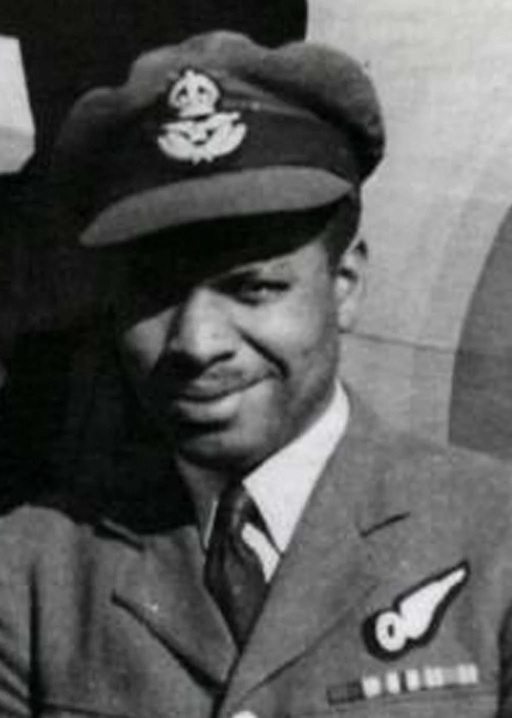
Like many of his generation Errol Barrow did not talk much about his war-time contribution as a Royal Air Force Volunteer Reserve (RAFVR) and left no autobiography or memoir. Errol Barrow’s time in the RAF between 1940 to 1947 has been pieced together using:
- his redacted Record of Service papers that were released by the UK Ministry of Defence Headquarters Air Command RAF Cranwell
- 88 Squadron Operations Record Books which are held by the UK National Archive at Kew:
– RAF form 540 – which summarises daily operations by month
– RAF form 541 – which list by day the aircraft and crews that took part in daily operations. - RCAF training records
- the RAF logbook entries belonging to his pilots F/O Andrew Cole RAF and S/L Geoff Norton RAF
- supplemented with stories from those that flew with him.
Errol Barrow’s story highlights the important contribution made during World War II of the men and women from the Caribbean who volunteered to serve in the RAF as: pilots, navigators, flight engineers, air gunners and ground crew.
When looking at West Indian World War II volunteers a key question is what was their driving force. Outside of the UK there was no compulsory conscription. For some it might have been a deep love for the motherland as depicted by the Remembrance Sunday hymn “I vow to thee my country” which describes how a Christian owes his loyalties to both his homeland and the heavenly kingdom.
For the majority, like Errol Barrow, it was more likely that they joined-up to lend support to the motherland. The alternative, should Hitler have defeated the motherland, was Black people, like Jews and Roma (Gypsies) would have been seen as inferior and deprived of their rights and most likely would have been returned to slavery or “ethnically cleansed” as was happening in Germany and in the Nazi occupied Eastern territories of Poland and the Soviet Union.
The newcomers from the Caribbean were joining an air force that had only abandoned the services’ “colour bar” against non-European enlistment in October 1939, in a time of need, and took racism seriously. An Air Ministry (RAF) Confidential Order of June 1944 was unequivocal:
All ranks should clearly understand that there is no colour bar in the Royal Air Force… any instant of discrimination on grounds of colour by white officers or airmen or any attitude of hostility towards personnel of non-European descent should be immediately and severely checked.
Source: RAF Museum Online Exhibitions – Pilots of the Caribbean: The Second World War, 1939 to 1945 : Recruitment.
The rules against racial discrimination introduced by the RAF in the 1940s would not be seen in the civilian workplace until the 1970s.
The loss rate for those Caribbean volunteers who joined the RAF was 30 per cent. For those that were part of RAF Bomber Command they had a worse chance of survival than an infantry officer in World War I with a loss rate of 55 per cent to 60 per cent! The Second Contingent which in 1940 recruited airmen from Barbados for the RAF had a loss rate of 50 per cent.
This post is an excerpt from the article F/O Errol Barrow RAF Navigator World War II & Prime Minister of Barbados which originally appeared on BajanThings on 12 March 2019. Visit the original post for further details about Errol Barrow’s early life and seven years in the RAF:
- Errol Barrow’s early life 1920-1940
- Errol Barrow volunteers for the RAF in 1940
- Initial RAF training in the UK (1941 -1943)
- RAF aircrew training in Canada (1943 – 1944)
- Errol Barrow and crew join RAF 88 Squadron, “B” Flight, 2TAF (20th September 1944)
- Errol Barrow RAF Navigator (RAF Observer)
- 88 Squadron “B” Flight 2TAF, selective sorties 1944 -1945
- 23rd September 1944 – Barrow in Boston III BZ 229 / U (flight time 1hr 45mins)
- 24th September 1944 – No operations or other flying took place due to adverse weather conditions.
- 25th September 1944 – Barrow in Boston IV BZ 411 / R (flight time 3hr 20mins)
- 88 Squadron move from RAF Hartford Bridge (later known as: Blackbushe) in Hampshire to Vitry-en-Artois in France
- 1st January 1945 (morning) – Barrow in Boston IV BZ 432 / V (flight time 2hr 30mins)
- 1st January 1945 (afternoon) – Barrow in Boston III BZ 432 / V (flight time 2hr 22mins)
- 2nd January 1945 – No operations or other flying took place due to adverse weather conditions.
- 3rd January 1945 – Barrow in Boston III BZ 432 / V (flight time 2hr 20mins)
- 4th January 1945 – No operations or other flying took place due to adverse weather conditions.
- 5th January 1945 (morning) – Barrow in Boston IV BZ 432 / V (flight time 1hr 38mins)
- 5th January 1945 (afternoon) – Barrow in Boston IV BZ 432 / V (flight time 2hr 38mins)
- 6th January 1945 – Barrow in Boston III BZ 377 / P (flight time 1hr 9mins)
- 7th to 20th January 1945 – No operations or other flying took place due to weather conditions
- 23rd January 1945 – Barrow in Boston IV BZ 458 / R (flight time 1hr 43mins)
- Disbandment of RAF 88 Squadron on 6th April 1945
- Errol Barrow: RAF Navigator, BAFO Communications Squadron Germany (1945 – 1947)
- Errol Barrow: cat napping
- Why was Errol Barrow called Dipper?
- A chance meeting with Errol Barrow’s pilot in RAF 88 Squadron “B” Flight: Andrew Cole
- Tribute to Errol Barrow by Andrew Cole
- Some anecdotes shared by Squadron Leader Geoff Norton DFC – pilot in 88 Squadron “A” Flight and pilot within C-in-C Military Governors Flight
- Whisking a German World War II Scientist out of Germany
- Hitler’s Wolf Lair Headquarters
- Flying with S/Ldr Neville Freeman – officer commanding the C-in-C Military Governors Flight
- Useful Reference Material and Notes


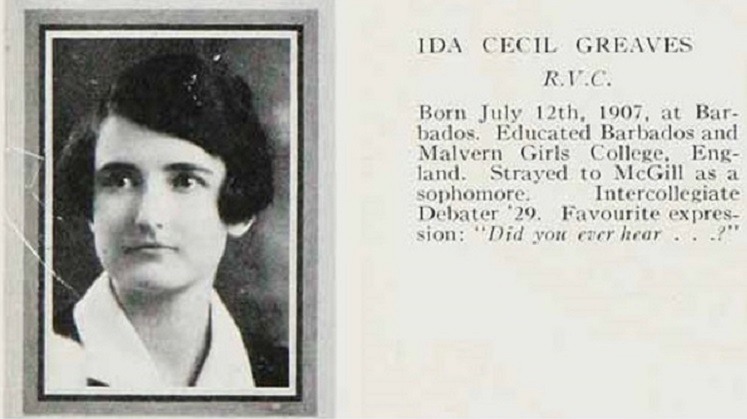
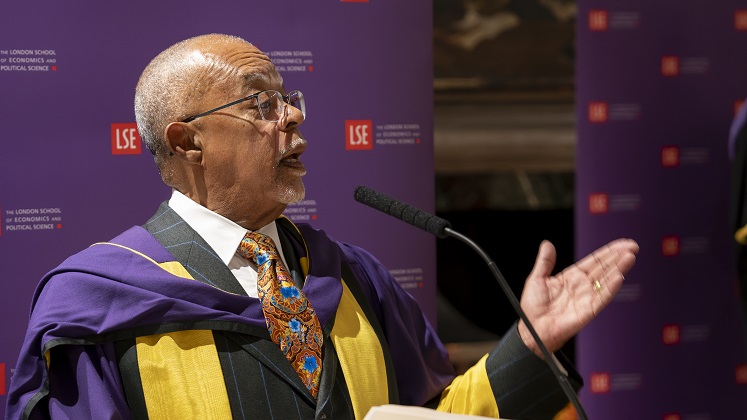
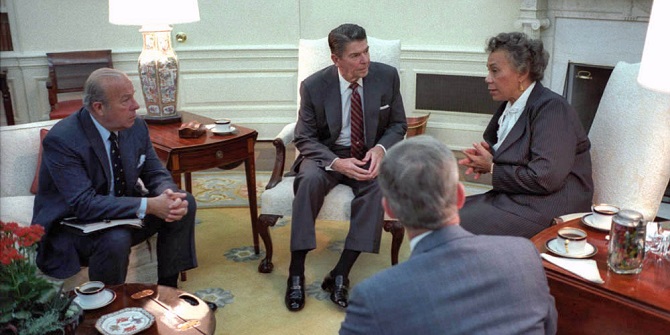

GM Peter,
Thanks very much for posting.This is an excellent follow-up to the earlier article you wrote on E W Barrow. It’s really great to see that both the RAF and the LSE have seen it fit to honour him since he left no written memoirs.
I am seeking permission to use parts of this article in the Nation newspaper.
Thanks, Sandra